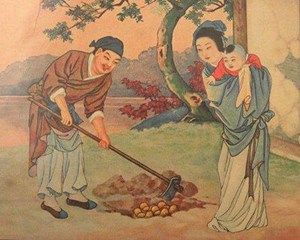(单词翻译:单击)
埋儿奉母,又名“为母埋儿”、“郭巨埋儿”,为中国传统民间故事此故事在东晋干宝所著《搜神记》、宋代《太平广记》、元代郭居敬的《二十四孝》、明代嘉靖时期的《彰德府志》等书中均有记载。郭巨,晋代隆虑人(今河南省林州市人),原本家道殷实。父亲死后,他把家产分作两份,给了两个弟弟,自己独取母亲供养,对母极孝。后家境逐渐贫困,妻子生一男孩,郭巨的母亲非常疼爱孙子,自己总舍不得吃饭,却把仅有的食物留给孙子吃。郭巨因此深感不安,觉得养这个孩子必然影响供养母亲,遂和妻子商议:“儿子可以再有,母亲死了不能复活,不如埋掉儿子,节省些粮食供养母亲。”当他们挖坑时,在地下二尺处忽见一坛黄金,上面写:“天赐孝子郭巨,官不得取,民不得夺。”夫妻得到黄金,回家孝敬母亲,并得以兼养孩子。从此,郭巨不仅过上了好日子,而且孝顺的美名传遍天下。

《二十四孝·郭巨为母埋儿》
汉郭巨,家贫。有子三岁,母尝减食与之。巨谓妻曰:“贫乏不能供母,子又分母之食,盍埋此子?儿可再有,母不可复得。”妻不敢违。巨遂掘坑三尺余,忽见黄金一釜,上有字云:“天赐黄金,孝子郭巨,官不得夺,民不得取。”
诗曰:
郭巨思供给,埋儿愿母存。
黄金天所赐,光彩照寒门。
Guo Ju Intended to Bury His Son to Save His Mother
Guo Ju of the Han Dynasty, lived a poverty-stricken life. He had a son of three years old. Guo Ju's mother left some of what she ate for her grandson. Guo Ju said to his wife, "As our family is too poor to give our mother enough to eat, besides, our son also shares some with our mother. Why not bury our son? We can have sons again, but we can never have our mother again." His wife dared not say no. Therefore, Guo Ju went to dig a one-meter pit, but just at that time, he found a wok of gold, with a few words on it, "Gold from God for the dutiful son Guo Ju. The officials cannot rob it, and others cannot take it."
更多精品翻译素材,敬请关注可可英语。


